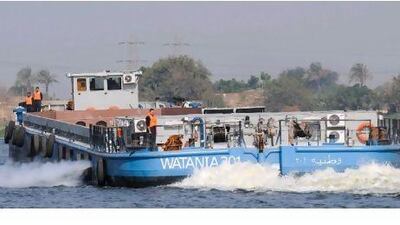Twenty kilometres north of Cairo, Mike Power stands looking out from the Nile port of Tanash towards the Watania 201, the first of 10 new self-propelled barges ordered by the Nile Cargo barge operating company.
Mr Power came to Cairo a year and a half ago to run the barge company as well as its sister operation, the National River Ports Management Company, which will operate eight ports along the Nile between the Mediterranean coast and the Aswan High Dam. Both companies were set up by Citadel Capital as part of its strategy of bringing more river transportation back to the Nile.
"We have equity in place of about US$150 million [Dh550.95m] and then there's the first tranche of a $60m loan also in place," said Mr Power. "We have another being finalised right now for the same amount. That will put most of the initial investment in place for the first tranche of barges and virtually all the ports we require as well as the equipment."
The Watania 201 is the first of 100 new barges - not all self-propelled - the company intends to run on the river. It is a somewhat counter-intuitive move, since the amount of cargo transported via the Nile has been dropping, decade by decade.
Less than 1 per cent of goods moved in Egypt now travels on the river. Most of the rest, some 94 per cent, is carried on often overladen and frequently unsafe trucks clogging the country's roads.
Part of the new company's selling point is that using just one of its new self-propelled barges, which can carry a maximum of 1,600 tonnes, is equivalent to taking 50 trucks off the road.
As Mr Power says: "There's a study been done in Europe that shows that if you use five litres of fuel to transport one tonne of cargo by barge it can travel 550km; if you put it on rail you get about 300km, but if you put it on a truck you only get 100km."
And since barges also use about two-thirds less fuel than trucks to carry the same weight of goods a similar distance, one might think that Egyptian logistics companies would be queuing up to get back to the river.
One factor keeping them on the roads is vast government subsidies on petrol and diesel. Next year, fuel subsidies are expected to total $13 billion, more than the country spends on education.
The government has promised to end the subsidies, although no one expects that to happen any time soon. But the fact that it might happen at all is one of the reasons that Ahmed Heikal, the Citadel chairman, thought it was time to get into the business of river transportation.
"It's in anticipation of this partial removal of subsidies," he said. "The economics will improve over time."
It also helps that getting more traffic on the Nile is government policy. So far it has spent $155m repairing ports and locks as well as dredging a navigable channel, said Karim Abu el Khair, the chairman of Egypt's river transport authority: "100 metres wide and 2.3 metres deep from the river's lowest level". That still will not stop the river becoming almost non-navigable during the winter months, but Citadel says it has factored this into its business model and that last year, even in January, it was still able to transport 20,000-30,000 tonnes of cargo.
Another issue is the act of putting more vessels on to the Nile. At the moment, most of the barges on the river are old and somewhat dilapidated; in fact, in September, a spill from a barge run by another company dumped 90 tonnes of gasoline into the river near Luxor.
Some people, including Dia El Din Ahmed El Quosy, one of Egypt's leading experts in water management, worry that greater river use means an increased risk of spillage.
"Personally I am, in a way, against this because of the fact that unless you have a very strict plan to inspect all these vessels sailing up and down, then you are prone to all kinds of pollution, from fuel, from grease, from oil, and from human waste as well," he said. "This is the place all Egyptians drink from and eat from."
The company maintains that since its new vessels are being built to the highest international standards and will be captained by experienced pilots, its barges will actually increase safety.
That remains to be seen, but one thing is certain: given the fact that the company has contracts to carry 4 million tonnes of cargo and forecasts it will be transporting 15 million tonnes by 2014, the Nile will soon be a much busier place.

